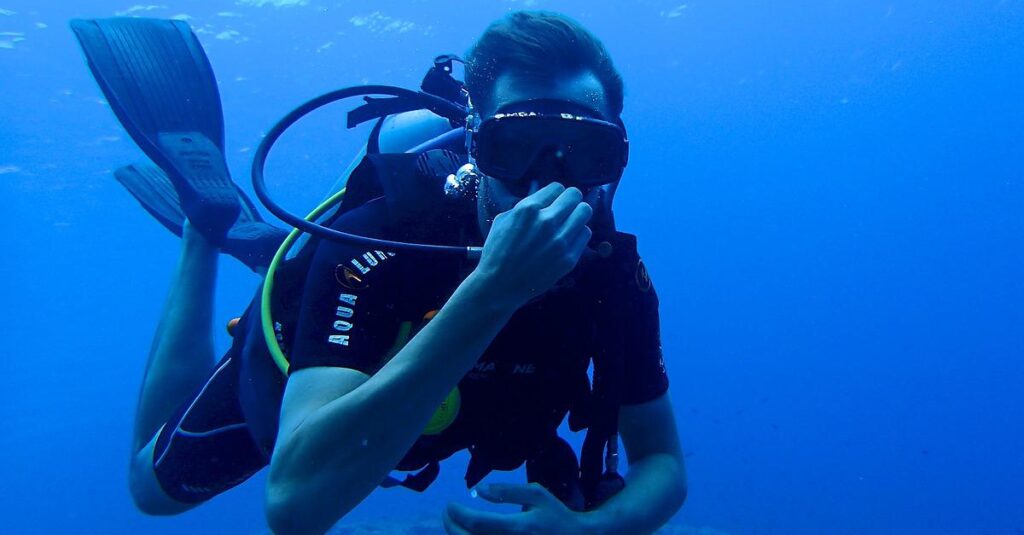

If you’re the type of person who prefers to learn on your own, you might be tempted to self-teach scuba diving. While there is plenty of information available online, most professionals recommend this.
You cannot self-teach scuba diving. While you may gather basic information through self-paced courses, complete understanding and application involves the oversight of a professional dive instructor.
Keep reading as we explain what experience you need prior to scuba diving and how the sport works for beginners. We’ll also provide a basic timeline for how long it takes to learn to scuba dive and what to expect during this time.
Can You Go Scuba Diving With No Experience?
You cannot scuba dive with no experience. Even highly controlled dives require experience with:
- Swimming underwater
- Using scuba diving gear
- Communicating with others during the dive
You can scuba dive without certification in some areas, but this does not excuse a lack of experience. Diving without a clear understanding of what to expect and how to respond to certain situations puts you and those you dive with at risk.
Is Scuba Diving for Beginners?
Scuba diving is a great sport for beginners. It doesn’t require years of experience to get into, and you can dive once you finish your beginning coursework. While there is plenty of room for improvement, a beginner has plenty of opportunities to:
- Use scuba diving for low-impact exercise
- Experience marine life
- Spend time with friends and other hobbyists
Scuba diving is not as beginner friendly for those who cannot swim or those who have preexisting conditions, such as a prior collapsed lung.
What Beginners Should Know About Scuba Diving
SCUBA is actually an acronym for “Self Contained Underwater Breathing Apparatus”. This means you use air from a tank to breathe underwater, and you need to adapt to breathing in this way before you can scuba dive properly and safely.
Scuba diving is also a relatively new sport for recreational use, but there are plenty of well-planned courses and well-informed instructors waiting to welcome you to this unique opportunity.
Can You Scuba Dive in One Day?
While there are places that allow you to learn and dive in the same day, these are not a replacement for a full scuba diving course and certification.
Single day sessions are best for:
- Resort diving for those one vacation who choose to dive at the last second. They go over the basics and provide the opportunity to dive in a controlled environment, nowhere near as deep, risky, or enriching as the average dive. You need to repeat the course to dive again.
- Try dives offered by dive centers so you can test the experience before making a commitment. Not every dive center offers try dives, but these are a good idea if you’re fickle and want to know how you feel about diving. Many perform a try dive before planning a vacation so they know where they want to go and what they want to do.
These two situations are exceptions to the standard course length of 4 days to 4 weeks. Most courses involve a blended learning plan now that allows you to self-pace through eLearning before spending time in the water with a certified instructor.
How Do I Learn to Dive?
Learning to dive involves learning skills and techniques, then putting them into practice.
You can start your course online before moving to in-person training, but you need to show full understanding of the material before you receive certification that clears you to dive recreationally.
Learning Skills and Techniques
Your online course and instructor will make sure you understand the skills and techniques needed to dive safely. These are often broken into step-by-step processes that cover situations such as:
- How you breathe underwater using a regulator
- How to clear your mask of fog or water
- Using hand signals to communicate with dive buddies
- Common emergency situations and proper responses
- How to equalize as you descend
- Timing your dive
The first portion of your course sets your expectations for practical application. It may involve a dizzying amount of information, but everything locks into place when you can put it into practice and start to experience it first-hand.
Putting in Practice
Once you have all the basic knowledge of scuba diving skills and techniques, it’s time to put it to practice. A dive instructor will set up time in the water for you to experience and apply everything you have learned.
They’ll make sure there are no misunderstandings about what you learned, correcting any mistakes you make and offering up tips and tricks you may not have heard in your learning process.
Putting everything into practice before getting into the ocean makes sure you know what to do without as much risk. Practicing in a controlled environment helps you build your confidence and skill set, and when you set out for your certification dives, you can focus on enjoying the open water.
